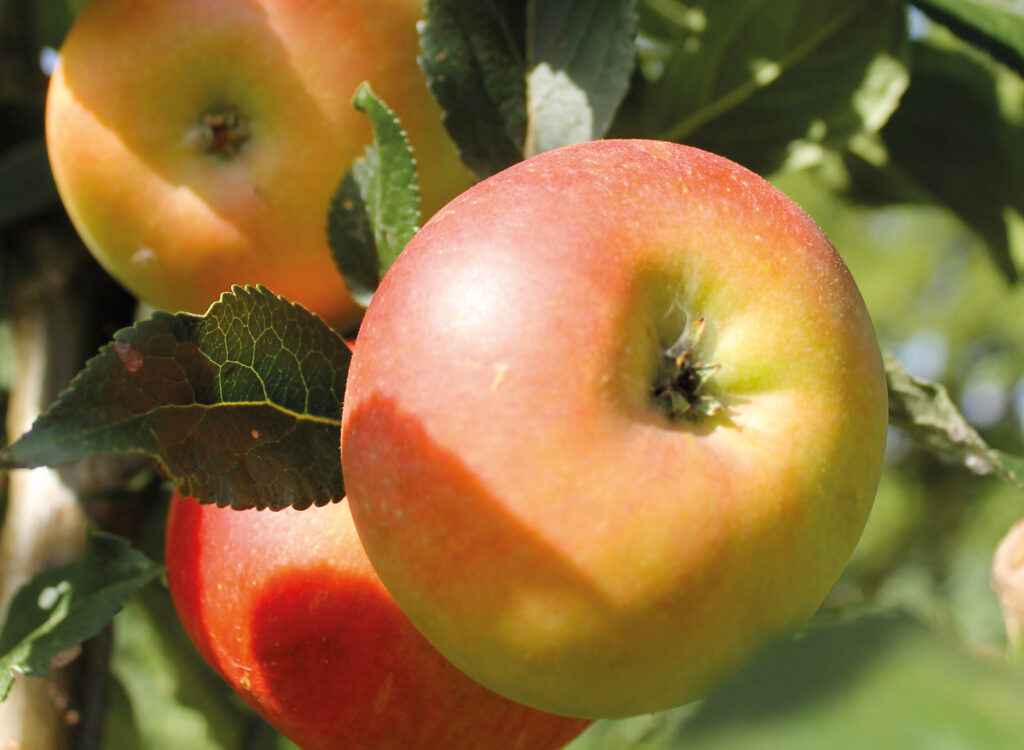Apples: Stewarding heritage varieties
4th January 2023
Fruit & Vine asked Tom Adams (AKA ‘Tom the Apple Man’) to discuss two heritage apple varieties this issue – although choosing just two varieties proved a challenge, as he explains

I find it virtually impossible to choose just one or two varieties to champion; my agroforestry approach to stewarding heritage fruit varieties means that diversity rules! At my site in North Shropshire, I have over 150 varieties grown in an alley cropping system, incorporating willow coppice to provide ramial chipped wood (RCW) with which to mulch the trees in both nursery and orchard. The coppice has the added benefit of acting as a buffer strip, impeding the spread of airborne diseases such as apple scab.
Commercial heritage varieties
I like to think that celebrating our heritage and producing a commercially viable crop needn’t be mutually exclusive endeavours. I’m using heritage varieties in my commercial-style orchard for direct-to-consumer and local wholesale, and find these lesser-known apples have a passionate
and growing customer base.
Ashmead’s Kernel, featured here, may be an unlikely winner given the qualities producers and consumers have come to expect from varieties such as Gala and Braeburn, unsurprisingly prized by supermarkets for their uniformity and clear, crisp skin. However, lurking beneath the unassuming russet of Ashmead’s Kernel is creamy, white and delicious flesh, unrivalled in terms of flavour. This russeting is also linked to antioxidant and anti-inflammatory qualities, suggesting Ashmead and its ilk might even be providing us with a healthier apple! Along with organic certification, this represents a USP for many health and environmentally-conscious consumers on the lookout for delicious UK-grown fruit with a story to tell.
PROFILE: Ashmead’s Kernel
Winning the RHS Award of Garden Merit in 1993 for its exceptional flavour, this is a heritage variety of versatile usage. Primarily a dessert apple, it can also be used in cooking and makes an outstanding cider.
Fruit qualities: A Gloucester dessert variety dating from the 1700s. What this heavily russeted, traditional variety lacks in regularity of shape, it more than makes up for in flavour and history. A good keeper, with a unique flavour that has been described as champagne-sherbet, pear drop, and orange blossom.
Management requirements: Taking longer than some modern varieties to come into fruit, (three years approx.), once established and with judicious winter pruning, Ashmead’s Kernel can give bountiful cropping in a good year. Some of its ‘bad rap’ for erratic cropping stems from the fact that it was once thought to be an ‘unreliable’ diploid variety, however research shows Ashmead’s Kernel to be a triploid variety, benefitting from a nearby pollinator such as a crab apple – once common practice in traditional orchards.
Growing season (timeline): After flowering in May, fruits typically set in June. With a late season of use, fruit is typically harvested in October for use from December to February; with excellent keeping qualities when properly stored, the flavour sweetens and intensifies with storage.
Spur fruiting, making it suitable for cordons or training on espaliers or wires where a commercial style is preferred – M9 dwarfing rootstocks are recommended for this style. Fruits may be smaller than we’ve come to expect from many commercial varieties, but this has the advantage of meaning thinning is not usually required.
Pollination group D – this is a self-sterile variety which requires a pollinator, it can be pollinated by trees in group C, D and E.
Disease resistance: Shows good resistance to apple scab and mildew, making it a good choice for orchards in wetter areas of the UK. Can suffer from bitter pit, related to the irregular uptake of water, so mulching at the base of the trees is recommended.
PROFILE: Discovery
Originating from Essex in the 1940s, Discovery is ancestor to varieties including Katy and Scrumptious.
Fruits of delicate strawberry flavour, with a crisp and juicy bite herald the start of the UK apple season. Best enjoyed as soon as possible after harvest if intended as an eater, this variety represents a valuable option for ‘direct to customer’ sales. As the arrival of Discovery apples is something of an occasion, it is particularly useful for PYO sites and farm shops. Where an added value product is preferred or there is excess, Discovery makes an excellent, aromatic juice and is therefore a useful diversification variety.
Management requirements: A compact cultivar adaptable to many training forms, Discovery is a partial tip bearer and requires regular pruning. Some fruit thinning may be required depending on preferred size, which is usually around 60–70mm for commercial markets.
Growing season (timeline): Pollination group 3, the flowers are rarely affected by late frosts meaning Discovery is suitable for all but the coldest areas of the UK. It is a self-sterile variety requiring a pollination partner to produce fruit. Season of use is August to mid-September.
Disease resistance: Showing good resistance to apple scab and powdery mildew.
About our author
Tom Adams is a fruit tree nurseryman growing a range of organic, very rare heritage varieties, as well as modern varieties suitable for traditional orchards, commercial settings, small holdings, and the home garden at his Soil Association organic certified agroforestry nursery site in Shropshire.
He specialises in hard-to-find heritage apple varieties from the English/Welsh borderlands and further South into Herefordshire and Gloucestershire; building his collection of apples, pears, cherries, quince, plum, damson and medlar from all over the country, to help protect plant biodiversity, and ensure our living heritage continues to be enjoyed for generations to come.
Tom has been in the trade for 20 years. As well as selling bare root trees, he provides consultancy, tuition and teaches on the accredited Certificate in Community Orcharding award.
For more info visit tomtheappleman.co.uk
